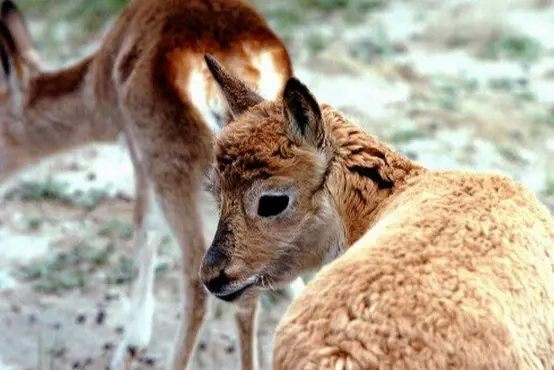The deaths of seven Przewalski's gazelle, a species even more endangered than the giant panda, have aroused debate over whether grassland fences should be removed completely.
The antelopes were killed by barbed wire fences around Qinghai Lake, the last stronghold of the species, in northwest China's Qinghai Province, when they tried to jump the fences.
The deaths were discovered by Namgyal, an environmental volunteer and herdsman, on Saturday when patrolling the lake on his motorcycle.
"Six were male. Their dead bodies were stiff. Some were hanging on the wire, while others were lying in pools of blood," he said.
Wang Enguang, head of wildlife and nature reserves in Qinghai, told Xinhua that the local government has sent investigators to the site.
"They died in different locations and at various time. Some might have been chased by predators when they tried to jump the fences," Wang said.
Przewalski's gazelle has China's highest level of protection. Once found all over north and northwest China, the gazelle is now found only around Qinghai Lake.
It was named after the Russian explorer who collected a specimen and took it back to St. Petersburg in 1875.
Despite the population of Przewalski's gazelles recovering from 300 in the mid-1990s to more than 1,000 today, and their habitat being enlarged, they still face a fight for survival against highways, wolves, the weather and, most dangerously, fences.
It was not the first time that fences have killed gazelles during migration. The new tragedy questions the future of these fences, originally built to restrict the movement of livestock, mark ownership of grassland, and to increase productivity.
Shao Wenjie, a volunteer with NGO Nature University, said on Sina Weibo that completely removing the fences was the only solution.
In an answer to a netizen's question, Shao said the fences are as harmful as highways, chopping the once endless grasslands into pieces, fragmenting the gazelle habitat, and genetically isolating groups.
Przewalski's gazelles are sometimes able to jump over or squeeze under fences, but may be seriously hurt by the barbed wire or become fatally entangled.
Wu Yonglin, a gazelle researcher at Qinghai Lake national nature reserve, revealed that there is no specific data on how many gazelles are killed by fences every year, but in 2010, the number was between 30 and 40.
The local government has suggested lowering the height of fences and taking off the barbed wire rather than completely removing them, considering their function and the interests of the herdsmen.
According to staff at the reserve, the standard fences are around 1.5 meters high, which may kill or hurt the gazelles, especially the old and pregnant. If the fences could be lowered to 1.2 meters and the barbed wire taken off, the gazelles would jump over them easily.
Since 2009, Qinghai government has spent more than 8.4 million yuan (around 1.3 million U.S. dollars) on protecting Przewalski's gazelle, including restoring habitat, lowering fences, removing barbed wire and building ponds.
Wang Enguang said they had adjusted around 500 kilometers of fences around the lake to help isolated groups intermingle. Complete removal of all fences, as desired by NGOs and volunteers, is not possible at present.
The range was divided into patches and assigned to individual households in the early 1980s when the government introduced a household responsibility contract system to transform the economy and preserve pasture. More and more grassland has since been fenced as paddocks.
Animal husbandry is one of the main income sources for the area around Qinghai Lake. Fences were built by herdsmen to protect their livestock from predators and mark their ownership.
It is not easy to persuade them to remove the fences, as found by another report published by several universities in 2014. Most herdsmen around Qinghai Lake were very willing to reduce the height of their fences, but few were willing to completely remove them without compensation.
Qinghai Forestry Department will lower 98 kilometers of fences to 1.1 meters and take the barbed wire off 150 km of fences this year and the government will compensate the herdsmen.
"Things need time to change. Hopefully, people will show the same concern for the gazelles as they do for giant pandas," said Namgyal.
 简体中文
简体中文





